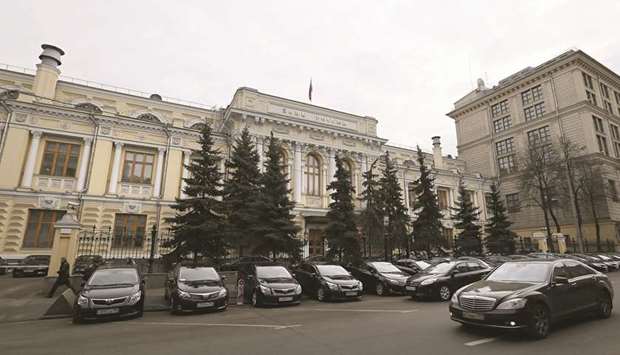Less than a month after seeing a quicker transition to looser monetary policy, Bank of Russia First Deputy Governor Ksenia Yudaeva conceded that “the probability of a reduction has declined” at a meeting next week.
While all options will be on the table, currency weakness could feed into consumer prices, a process that Yudaeva said may take a few months. “The trajectory of cuts in the key rate will be adjusted slightly upward,” Yudaeva told reporters in Washington. “It will be reduced more slowly than we planned earlier.”
The outlook offers the clearest glimpse into the central bank’s thinking before a week-long communication blackout starts on Friday ahead of its meeting.
With the toughest US sanctions yet sending the rouble to its steepest drop since June 2015, the Bank of Russia has already had to tweak its approach, pausing purchases of foreign currency for the Finance Ministry for six days.
Until this month, record-low inflation has allowed policymakers to deliver rate cuts at five straight meetings.
But now most economists say policy makers will hold off from easing on April 27 and leave their benchmark at 7.25%. Before the latest sanctions, almost all the analysts surveyed saw another quarter-point cut in the key rate. The central bank is unlikely to change its “neutral” range for rates from between 6% and 7% since it’s already “quite wide,” according to Yudaeva.
That’s the level of borrowing costs that contributes neither to “a reduction nor an acceleration” in inflation relative to its target level of around 4%. The fallout from new sanctions on the Russian currency means consumer-price growth, which already accelerated last month, may return to the goal quicker than earlier estimated, the central bank said in a report on Friday.
The rouble has lost over 7% against the dollar this month, the worst performance in emerging markets. It traded 1% weaker against the dollar in Moscow on Friday. Investors anticipate the Russian currency will remain among the world’s most unstable, with its one-month implied volatility at the highest globally. Currency pass-through to consumer prices has become less potent, meaning a weaker rouble may not have a big impact on inflation, according to Yudaeva.
Since the shock was relatively short-lived, its effect may be “less pronounced and more spread out over time” as the economy takes longer to respond, Yudaeva said.
“The weakening of the exchange rate will have a certain effect on inflation and will affect the next forecast,” she said. “It will be clearer at subsequent meetings how the situation is developing and what effects it has on inflation.”

